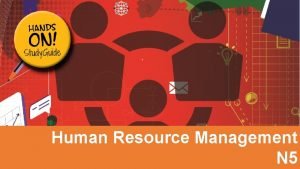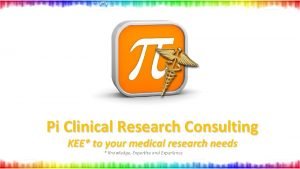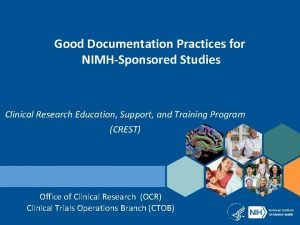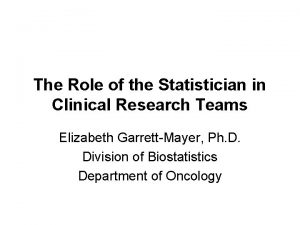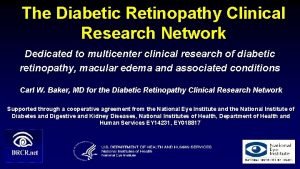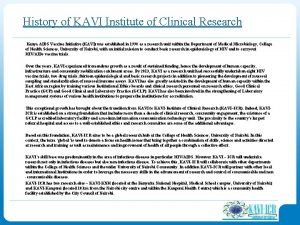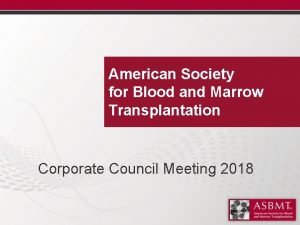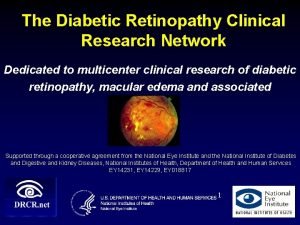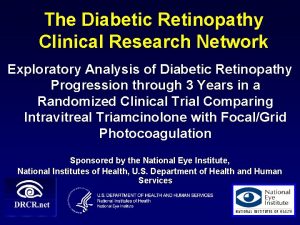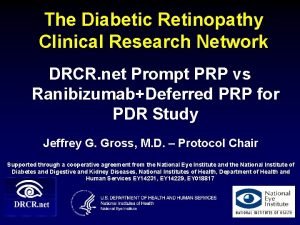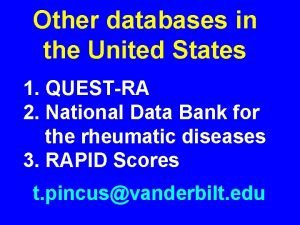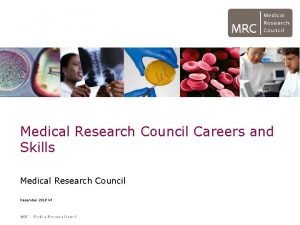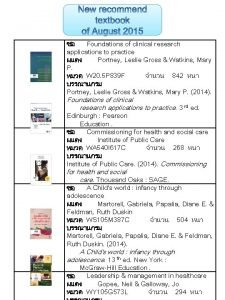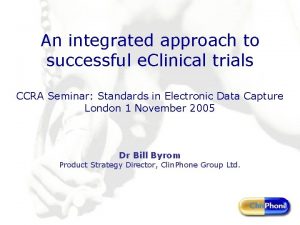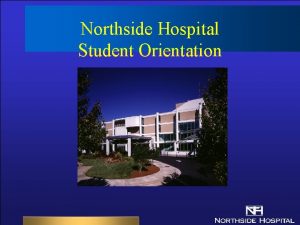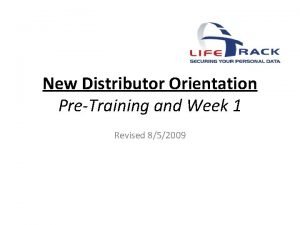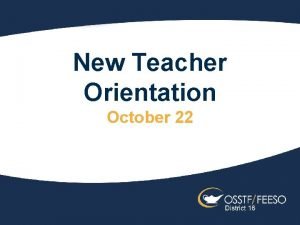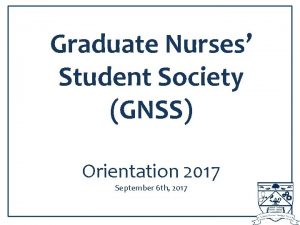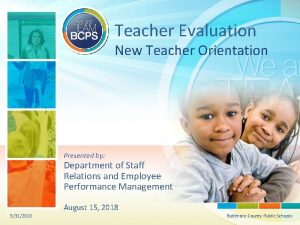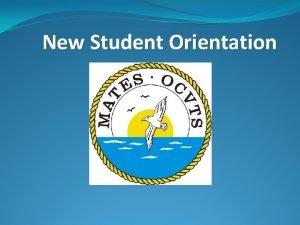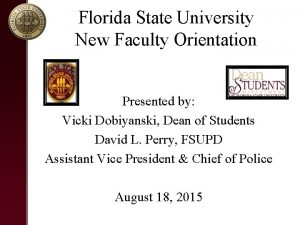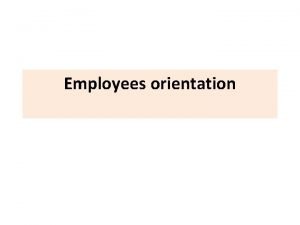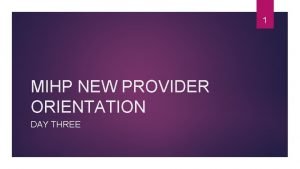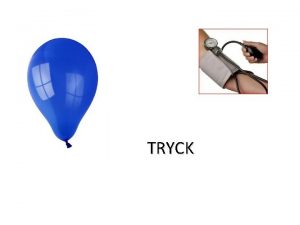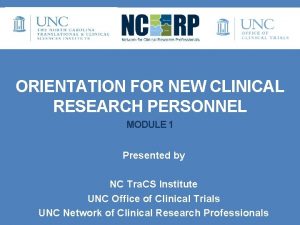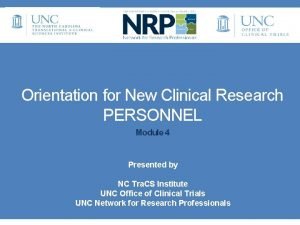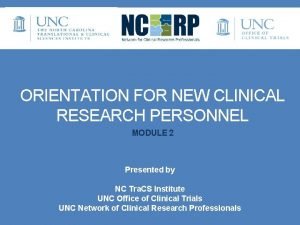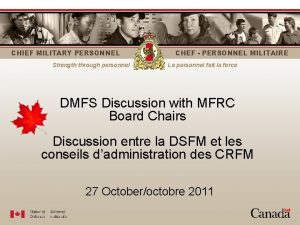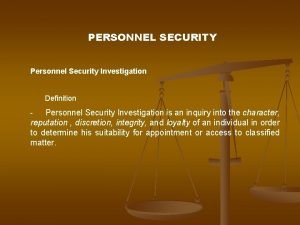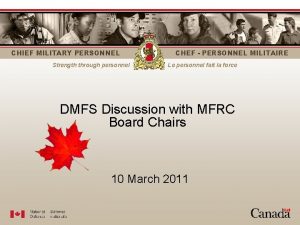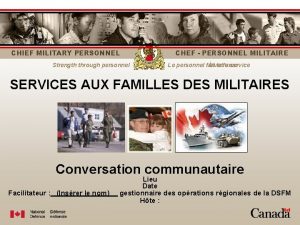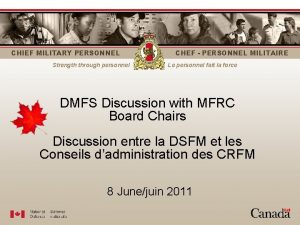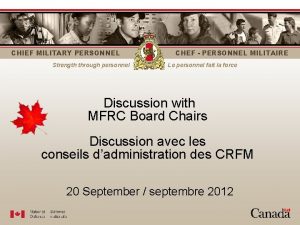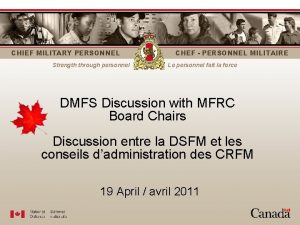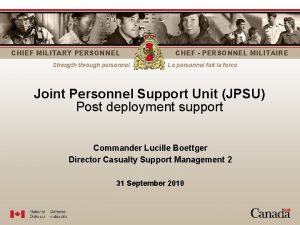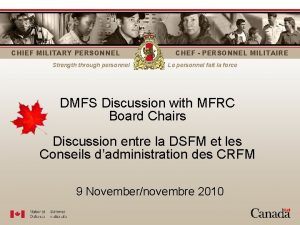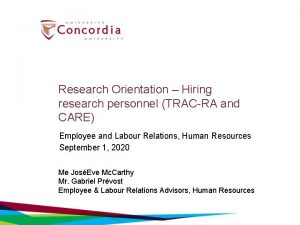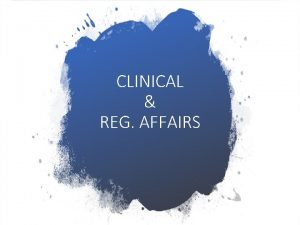Orientation for New Clinical Research PERSONNEL Module 4



































































- Slides: 67

Orientation for New Clinical Research PERSONNEL Module 4 • Presented by • NC Tra. CS Institute • UNC Office of Clinical Trials • UNC Network of Clinical Research Professionals

Overall Agenda for Orientation • Module 1: Introduction to Clinical Research, Education, and IRB • Module 2: Informed Consent, Documentation, GCP and Essential Documents • Module 3: Contracting, Billing Coverage Analysis, Clinical. Trials. gov, Budgets and Accounting, Study start-up • Module 4: COI, Privacy/HIPAA, Recruitment and IDS / Device Policy • Module 5: NIH Public Access Policy, From CDA to Close Out

CONFLICT OF INTEREST Joy Bryde, MSW Conflict of Interest Officer Conflict of Interest Program jbryde@unc. edu

Who is Covered by the Policy on Individual Conflicts of Interest (COI) and Commitment? UNC Chapel Hill Eight sections for Conflict of Interest, including Research

What is a COI? Conflict of interest is a situation in which financial or other personal considerations: • may compromise, • may involve the potential for compromising, or • may have the appearance of compromising an employee’s objectivity in meeting University duties or responsibilities, including research activities. UNC Board of Governors Policy Manual

Visualizing COI at UNC External or Personal Interests Institutional Duties • Actual Conflict of Interest • Potential Conflict of Interest • Appearance of a Conflict of Interest

What is a COI ? (continued) The bias that such conflicts may impart can affect many University duties, including: • decisions about personnel, • the purchase of equipment and other supplies, • the collection, analysis and interpretation of data, • the sharing of research results, • the choice of research protocols, • the use of statistical methods, • and the mentoring and judgment of student work.

Why the Conflict of Interest (COI) Process? Comply with: • UNC Board of Governors’ Policies and Regulations • North Carolina State Statutes and Regulations • Federal requirements (funding, human subjects) • DHHS 42 CFR Part 50, 45 CFR Part 94 effective 08/24/ 2012 • NSF Grant and Administrative Guidelines January 2013 Mantra: Disclose and Manage

Terms to know • COI: Conflict of Interest • FCOI: Financial Conflict of Interest means a Financial Interest that could directly and significantly affect the design, conduct, or reporting of research. • Disclosure: to submit to the University the details of any interests, financial or personal, that might be a potential conflict of interest • Disclosure: to share details of a conflict of interest with subjects, a research team or in presentations or publications as necessary

COI Snapshot FCOIs COI Disclosure COI Training

How Does the Research COI Process Work? • COI Training coi-training. unc. edu • Event-based Disclosure - Sponsored Research • - IRB Protocols • Evaluation and Review • Management • Report to Sponsor • Update Disclosure Annually or on Change of Circumstances •

Research COI Disclosures IRB (IRBIS) Principal Investigator OSR (RAMSe. S) Lead Principal Investigator Co-investigator Investigator Postdoctoral Research Associate Faculty Advisor Clinical Research Coordinator Other Key Participant (UNC Faculty) Project Manager or Study Coordinator Not trigger COI disclosures: Research Assistant, Regulatory Associate, Other (Read Only Access) Independent Consultant Investigator Not trigger COI disclosures: Fellow, Graduate Research Assistant, Other Key Participant, Project Manager, Technical Staff, Undergraduate Student, Administrative Contact, Administrative Assistant

Why is a Disclosure Required for Each Study and Reviewed for a “Known” Conflict ? • Federal regulation • University Policy • Each study is different even if the “conflict” appears to be the same • Different drugs • Different protocol • Different people • For human subjects research, informed consent text must be context specific

What Happens Next? No conflicts indicated • System filters every 10 minutes • IRBIS/Ramses automatically updated Potential conflicts indicated • Initial Evaluation at COI Office, usually further information is needed • Next Step • Expedited Review with Committee Chair(s) (Existing Management plans or <$10 K) OR • Full Committee (New conflict, >10 K) NOTE: Five Standing COI Committees – Medicine, Public Health, Dentistry, Pharmacy and College of Arts & Sciences. Some committees meet 1 x per month; others every 2 -3 months.

What are Financial Interests? Tangible • Personal Income - real or potential value • Equity/Stock/Options (mutual funds excluded) • Royalties/licensing fees/copyrights • Indirect – family member • Gifts (for self or others)

What are Non-Financial Interests? • Board membership • Executive position • Scientific or technical advisor • Trustee • Volunteer position • (such as fundraising)

Management Principles • Transparency • Honoring the Student/ Trainee Experience • Protection of the credibility of the individual doing the work

Management Tools • Management Plans • • Public Disclosure Independent Review of Data Change in Roles Monitoring Committees • Alternative Options for Trainees • Alternative Administrative Routing NOTE: Significant financial interests presumed not allowable in human subjects research, particularly for a principal investigator.

Federal Anti-Kickback Statute Purpose: To protect patients and federal health care programs from fraud and abuse Summary: Prohibits the solicitation, receipt, offer or payment of remuneration “in return for” or “to induce” the referral of program related business, arranging for, or recommending, the purchase, lease, or ordering of any item or service reimbursed by a federal healthcare program Penalties • Civil: Fines up to $50, 000; Exclusion from federal health care programs • Criminal: Felony; Up to five years in prison; Fines up to $25, 000

Anti-Kickback: Clinical Trial Risks & Solutions Risks Potential Solutions Direct payments to investigators Institutional financial management Incentives for investigators ( exotic meeting locations) Institutional contracting Unbudgeted payments Institutional financial management Financial COI Published and enforced COI policies Study biases (site selection, prescribing) IRB and training Excess funds Published Policy on Excess Fund Disposition Study merit Internal review and approval

UNC-CH CONFLICT OF INTEREST POLICY IS STRICTER THAN FDA • Stricter definition of significant financial interest • Project-by-project disclosure of financial and other conflicts of interest • Any changes to financial and other interests must be reported within 30 days. • University rules regarding compensation from Sponsors

UNC Policy regarding Compensation from Sponsors • University employees may not accept gifts, payments, or in-kind support (including but not limited to financial payments, gift certificates, books, conference attendance and payment of travel expenses) • as inducements for performance in a University project • except as expressly included in budgeted project costs in a contract between the University and the project sponsor. Pages 6 -7

FDA Investigator Financial Disclosure • This disclosure requires that the Principal Investigator certifies that s/he does not have a significant financial holding in the company with which he wishes to contract. • This helps to avoid conflict of interest situations in which the Investigator’s data may be called into question because of financial interest in the company.


Contact Information Joy M. Bryde, MSW Conflict of Interest Officer Mailing Address: Conflict of Interest Program UNC-CH CB 9103 Physical Address: 137 E. Franklin St. Suite 501 CVS Plaza E-mail: jbryde@unc. edu Phone: (919) 843 -9953 Website: http: //research. unc. edu/offices/coi/ General Email for questions: coi@unc. edu Websites: air. unc. edu coi-training. unc. edu

HIPAA, CONFIDENTIALITY AND PRIVACY/SECURITY Holly Benton, JD, Assistant Privacy Officer

Privacy • The right to seclusion, isolation from others • The right to be left alone • Increasingly, the right to be forgotten

Confidentiality • The obligation that those in a position of trust have to safeguard the private information of others


Clinical Research • What kind of information do you need? • Where will you get this information? • Medical record, interview/survey, data repository • How will you capture the information? • Is the information identifiable? • Where will the information be stored? • How will you protect this information? • Physical controls, encryption, professionally managed server, “off the grid” • What about secondary data? • Is reidentification a possibility?

HIPAA and Other Regulations • Health Insurance Portability and Accountability Act: • The Privacy Rule – Protected Health Information: PHI • Notice of Privacy Practices (advises that individually identifiable information may be used for “treatment, payment or operations” in the health care environment) • Authorization of patient or waiver by Institutional Review Board required to use identifiable information collected by healthcare provider • Authorization: written document that gives permission to use health information for research purposes (note, an authorization form is different from an informed consent form – “informed consent” refers to how a study will be conducted, possible risks and benefits) – data may not be used without authorization

HIPAA, cont’d • Elements of authorization: • Information you intend to use or disclose • To whom may the information be disclosed? • Who might receive the information (sponsor) • Purpose of the use or disclosure • Expiration date (“end of study” is acceptable) • Right not to sign • Right to revoke authorization in writing to stop collection • Waiver of authorization • Research cannot practicably be conducted • No more than minimal risk to subjects • Plan to protect identifiers • Plan to destroy identifiers

HIPAA, cont’d • HIPAA does not apply to de-identified data – all of the following must be removed: • Names • Geographic subdivisions smaller than a state • All elements of dates (except for year) for birth, admission, • • discharge, and death All ages over 89, including year Telephone numbers Fax numbers Email addresses Social Security numbers Medical record numbers Health plan beneficiary numbers

HIPAA, cont’d • Account numbers • Certificate/license numbers • Vehicle identifiers • Device identifiers • URLs • IP addresses • Biometric identifiers, including fingerprints and voiceprints • Full-face photographs

Other Regulations • NC Identity Theft Protection Act • FERPA: Family Educational Rights and Privacy Act • Note: Medical Identity Theft is among fastest growing crimes – consider impact of incorrect treatment history/diagnosis

UNC Structure • Privacy and Security Liaisons • HIPAA Steering Committee • Required training for use of PHI, access to systems containing sensitive information


When Things Go Wrong • Breaches • Loss of laptop, flash drive, files, tissue, etc. • Improper disposal – shred, shred • Intrusion • Access of information by person not authorized • E-mail: non secure transmission, subject lines w/ PHI • Notification Requirements • Individual, NC Attorney General, Office for Civil Rights (DHHS), Press • Elements of Notice • Circumstances, what happened, when? • What steps to take to protect ones information • Where to go for more help

Fines, Settlements, Prison • Applied to Individuals and Institutions • Destroyed Reputations • Loss of Public Trust


• Anyone responsible for information may be a target!



Questions? Thank you! Holly Benton hbbenton@email. unc. edu Holly Benton, JD Assistant Chief Privacy Officer (919) 445 -0232

RECRUITMENT SERVICES Carol Breland, RRT, MPH Research Recruitment Director NC Tra. CS

NC Tra. CS Recruitment Services Goal Accelerate Subject Recruitment across UNC! • Improve UNC research studies internet presence ü An engaging education website geared to the general public ü A simple research volunteer registration process ü A easy to read studies listing geared to the general public ü An online location for volunteers and UNC researchers to interface ü Use social media tools- Facebook, twitter, etc. • Disseminate research recruitment tools and methods ü Recruitment planning consultations ü Tool kit for recruitment campaigns ü Researcher networking ü E-recruitment methodologies ü Best practices workshops and presentations

Recruitment Planning A recruitment plan should be developed as soon as you receive the protocol, whether investigator-initiated, industry-sponsored, NIH or other sponsor. ü Start with a protocol review with a focus on recruitment – inclusion/exclusion criteria, study procedures and timelines ü Develop a subject profile and identify barriers and benefits to participation ü Consider the Carolina Data Warehouse for de-identified population statistics ü List your recruitment strategies ü For each strategy, list your tactics ü Create a promotional campaign with timeline ü Evaluate your plan for risks and develop contingencies

Barriers to Study Recruitment • A recent poll was conducted by Zogby Analytics for Research America • One question asked was “Fewer than 10% of Americans participate in clinical trials. Why don’t people take part in research studies? ” • Answers: • Not aware/lack of information = 53% • Lack of trust = 53% • Too risky = 51% • Adverse health outcomes = 44% • Little or no monetary compensation = 35% • Privacy Issues = 27% • Too much time = 27% • Not sure = 11%

Recruitment Tactics Before you develop your promotional campaign materials, ask yourself: What message do you want to convey to potential volunteers about the study? Remember, IRB approval of all recruitment promotional materials is required! Tactics to promote your study • Send a letter or call patients from approved registries or chart review • Posters, Pamphlets, Mailings (Flyers, letters, post cards) • Request identified data from the Carolina Data Warehouse • Develop a friendly and informative phone screen/script • Create social networking venues- Facebook, Twitter, Instagram • Attend Community events (fairs, flea markets, senior center health events) • Develop a UNC mass email • Consider media advertising - TV, radio, print, website Tactics that don’t require IRB approval • Contact your departmental doctors for referrals, develop a system for identification of potential subjects • Dear Doctor Letters –fax or email local providers, attend conferences, meet follow-up with a face to face meeting

Where Can I Learn More About Recruitment Services? Visit NC Tra. CS Recruitment Services Website http: //tracs. unc. edu/index. php/plan-research/research-recruitment Call or email NC Tra. CS at nctracs@unc. edu 919 966 -6022 Carol Breland, RRT, RCP, MPH brelandc@email. unc. edu 919 966 -6274

INVESTIGATIONAL DRUG SERVICE (IDS) Sue Pope, Pharmacist Manager, UNC IDS

IDS Operational Overview • IDS staff – 3 Pharmacist and 4 Technician FTEs • Studies managed – Over 330 total studies managed annually • IDS hours of operation – 0730 to 1600 Monday through Friday – IDS closed on major hospital and university holidays • Locations – 3 rd floor Memorial Hospital - Prepares medications for protocols that contain chemotherapy agents or IV products – Ground floor Neurosciences Hospital- Prepares medications for protocols that only contain oral, nonchemotherapy medications – 3 rd floor North Carolina Cancer Hospital

IDS Staff LEADERSHIP • Sue Pope, RPh Manager, IDS Email: spope@unch. unc. edu; Pager: 216 -2450, Office: 843 -9919 • Lindsey Poppe, Pharm. D, MS Assistant Director, Oncology, IDS Email: lpoppe@unch. unc. edu, Pager: 919 -216 -6597 PHARMACISTS • Linda Manor, RPh - Pharmacist Email: lmanor@unch. unc. edu • William Zhao, Pharm. D, Ph. D, Pharmacist Email: yzhao@unch. unc. edu • Elaine Vu, Pharm. D - Pharmacist Email: elaine. vu@unchealth. unc. edu IN AN EMERGENCY: • Outside of normal business hours – IDS maintains an on-call pager • In an emergency, an IDS clinical pharmacist can be reached by dialing 919 -216 -9727. They will provide assistance with: • Individual drug or research questions • The breaking of a treatment blind • Provide support for inpatient or IV room staff who may be unfamiliar with a particular research protocol

Investigational Drug Service Memorial Hospital, 3 rd Floor • 919 -966 -6359 (fax for orders) • Prepares medications for protocols that contain chemotherapy agents or IV products Neurosciences Hospital, Ground Floor • 919 -966 -8735 (fax for orders) • Prepares medications for protocols that only contain oral, non-chemotherapy medications

Do I need to use IDS for my research protocol? • For research protocols within the Hospital system, the clinical and distributional services of IDS are required • IDS Pharmacy required to be involved with all investigational studies that use an agent/drug – Joint Commission Medication Management standards • An agent/drug (including supplements) will be considered investigational, if following two criteria met: 1. 2. Administration of agent is part of protocol which requires IRB approval A subject is required to sign an Informed Consent Form before receiving the agent • Study locations other than main Hospital (e. g. Southern Village, Carrboro Dialysis, UNC School of Dentistry, EPA, etc)

How and when do I initiate a request for IDS services? • Request for IDS services should be initiated simultaneously with Contract negotiation (OCT) and request for IRB approval • IDS needs notification 6 to 8 weeks prior to 1 st study subject enrollment • Use Clinical Research Management System (CRMS) to submit protocol materials to IDS • Or, mail a completed IDS Request for Services (RFS) form, an Intensity Worksheet, and copy of protocol to the address below: Investigational Drug Service 3 rd Floor Main Hospital Department of Pharmacy CB 7600

What do the services of the IDS cost? • Complexity of protocol determines extent of IDS services used and cost. • Protocol Intensity Worksheet uses a fee for service pricing structure to determine budget for study. – Score the protocol with a point based system to determine the level of service – 4 levels of service - the level determines the start up and monthly fee. – One time start up fee, non-refundable, charged as soon as notebook is ready for dispensing. • Once drug is received and on shelf in IDS, begin billing monthly fee. • IDS ceases to bill when the drug has been removed from the pharmacy and a final pharmacy close out visit has been conducted. • Need protocol intensity worksheet before IDS can process memo for IRB.

What types of products can be compounded by IDS? • IDS can participate in treatment and placebo blinding for solid oral dosage forms • More complex compounding (liquid formulations, suppositories, troches, patches, etc) are outsourced to a local compounding pharmacy – Compounding fees of the local pharmacy apply in addition to standard IDS fees

How are research protocols handled outside of normal business hours? • Approximately 95% of research protocols are handled during normal business hours (M-F, 0730 to 1600) • However, if a research protocol will require after hour dispensation, an assigned pharmacist can coordinate this with Hospital inpatient Pharmacy or IV room • IDS pharmacist will coordinate delivery and storage of materials to the IV room/Inpatient Pharmacy as well as provide necessary in-services to the staff

Scheduling a Monitoring Visit • In an effort to accommodate all sponsors, monitoring visits and site initiation visits must be coordinated in advance. Contact your assigned pharmacist or call IDS • Call 966 -1766 or 966 -3469 or 966 -3213 to schedule • 2 monitoring visits allowed per day per IDS work area • Scheduled typically a month or more in advance • “Remote” monitoring visits are typically not supported by IDS

To whom and where can Clinical Trial Materials (CTM) be sent? • After contacting IDS (966 -1766) to make them aware of the incoming shipment as well as total volume of expected shipment, CTMs can be directed to the following address: Investigational Drug Services 3 rd Floor, Room N 3122 101 Manning Drive Chapel Hill, NC 27514 Phone: 919 -966 -2987 Fax: 919 -966 -6359

How are Investigational Medications Dispensed? IDS can begin preparing an investigational medication for your patient ONLY when: 1. Completed protocol orders are faxed to 3 W IDS or NS IDS Pharmacy 2. Orders must be signed by provider listed on 1572 and IRB application (original signature, not a copy) 3. Coordinator must give IDS verbal confirmation that patient is available for treatment (if pertinent to protocol) 4. Coordinators must present an original signed prescription order when picking up an investigational medication in the IDS pharmacy.

UNC INVESTIGATIONAL DEVICE POLICY Marie Rape, RN, BSN, CCRC Associate Director, Tra. CS Regulatory Service

Overview The University of North Carolina Health Care System must ensure compliance with regard to utilization of investigational devices. • There is a policy that governs: http: //intranet. unchealthcare. org/policies/unc-hcs-policies-pdf-new-format/ADMIN 0207. pdf • Administrative Procedures • Device Receipt • Device Storage • Device Use/Dispensing • Device Return

Administrative Procedures Prior to use of an investigational device, the following has to occur: • IRB approval • Final sponsor budget- will sponsor provide device free of cost or must UNC Hospitals purchase? (contact Hospital Purchasing) • Contract must be fully executed (UNC Office of Clinical Trials) • Must enter trial in CRMS and complete Billing Coverage Analysis(to obtain codes and charges from Integrated Billing Office) • Notify UNC HCS Reimbursement of pending trial. They will coordinate with Medicare Fiscal Intermediary.

Receipt, Storage, Use/Dispensing, Return • Device Receipt • What Does Protocol say? • Request Sponsor to notify of shipment • Comply with Sponsor documentation requirements • Device Storage • Secure, segregated, clearly identified as investigational • Device Use/Dispensing • Record use/dispensing information • Device Return • Read clinical trial agreement to see if contract terms govern • Record information • Work with UNC Hospital Purchasing to return unused devices.

PLEASE VISIT TRACS. UNC. EDU / RESEARCH CENTRAL FOR A COPY OF THIS PRESENTATION & ADDITIONAL HELPFUL INFORMATION
 Projet personnel d'orientation
Projet personnel d'orientation Example of polycentric approach
Example of polycentric approach Ndis quality safety and you
Ndis quality safety and you What is personnel research
What is personnel research C device module module 1
C device module module 1 Socra clinical research
Socra clinical research Dr charlotte lemech
Dr charlotte lemech Research design in clinical psychology
Research design in clinical psychology Pi clinical research consultancy
Pi clinical research consultancy Good documentation practices error correction
Good documentation practices error correction Role of statistician in clinical trials
Role of statistician in clinical trials Diabetic retinopathy clinical research network
Diabetic retinopathy clinical research network Kavi institute of clinical research
Kavi institute of clinical research Academic research organizations
Academic research organizations Translating research findings to clinical nursing practice
Translating research findings to clinical nursing practice Jasper clinical research
Jasper clinical research Asbmt clinical research training course
Asbmt clinical research training course Diabetic retinopathy clinical research network
Diabetic retinopathy clinical research network Clinical research support services
Clinical research support services Clinical research definition
Clinical research definition Diabetic retinopathy clinical research network
Diabetic retinopathy clinical research network Diabetic retinopathy clinical research network
Diabetic retinopathy clinical research network Drcr.net
Drcr.net Diabetic retinopathy clinical research network
Diabetic retinopathy clinical research network Questra clinical research
Questra clinical research Mrc clinical research training fellowship
Mrc clinical research training fellowship Foundations of clinical research applications to practice
Foundations of clinical research applications to practice Iwr ivr clinical
Iwr ivr clinical Northside hospital new hire orientation
Northside hospital new hire orientation Lions club new member orientation
Lions club new member orientation New distributor orientation program
New distributor orientation program New distributor orientation program
New distributor orientation program Famous toastmasters members
Famous toastmasters members New teacher orientation agenda
New teacher orientation agenda Gsu new student orientation
Gsu new student orientation Par panel bcps
Par panel bcps Emergency room nurse orientation
Emergency room nurse orientation Penn state factbook
Penn state factbook Rotary new member orientation
Rotary new member orientation Texas state university orientation
Texas state university orientation New teacher orientation presentation
New teacher orientation presentation Occ new student orientation
Occ new student orientation Fsu new faculty orientation
Fsu new faculty orientation Florida state university orientation
Florida state university orientation Cpcc transcript
Cpcc transcript Code of ethics 3 major sections
Code of ethics 3 major sections Nih new employee orientation
Nih new employee orientation Santa ana college plan c
Santa ana college plan c New employee orientation
New employee orientation Coca cola new hire orientation
Coca cola new hire orientation New provider orientation
New provider orientation Kontinuitetshantering
Kontinuitetshantering Typiska drag för en novell
Typiska drag för en novell Nationell inriktning för artificiell intelligens
Nationell inriktning för artificiell intelligens Ekologiskt fotavtryck
Ekologiskt fotavtryck Varför kallas perioden 1918-1939 för mellankrigstiden
Varför kallas perioden 1918-1939 för mellankrigstiden En lathund för arbete med kontinuitetshantering
En lathund för arbete med kontinuitetshantering Kassaregister ideell förening
Kassaregister ideell förening Tidbok för yrkesförare
Tidbok för yrkesförare A gastrica
A gastrica Vad är densitet
Vad är densitet Datorkunskap för nybörjare
Datorkunskap för nybörjare Stig kerman
Stig kerman Att skriva en debattartikel
Att skriva en debattartikel Autokratiskt ledarskap
Autokratiskt ledarskap Nyckelkompetenser för livslångt lärande
Nyckelkompetenser för livslångt lärande Påbyggnader för flakfordon
Påbyggnader för flakfordon Lufttryck formel
Lufttryck formel



